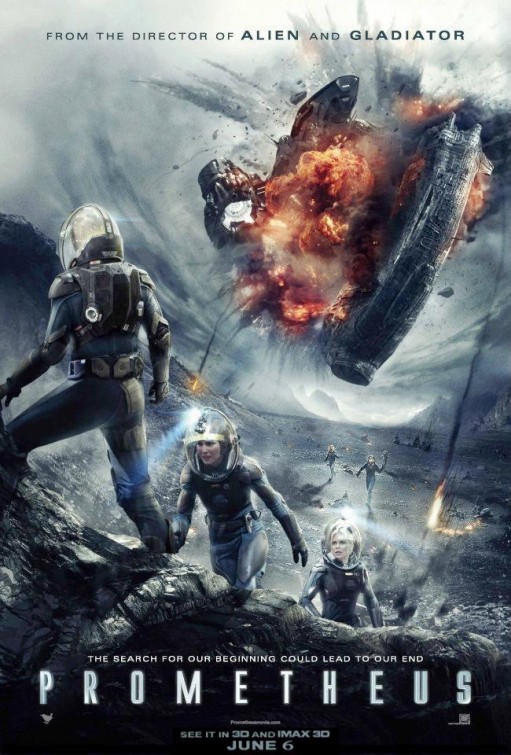They Went Looking For Our Beginning.. What They Found Could Be Our End
Director
Ridley Scott
Starring
Noomi Rapace
Michael Fassbender
Charlize Theron
Logan Marshall-Green
Guy Pearce
To describe Prometheus’ plot is to give away quite a lot, so you’ll have to forgive me if I omit certain details. Having discovered a common factor in several ancient civilisation’s writings, scientists Elizabeth Shaw [Rapace] and Charlie Holloway [Marshall-Green] have identified a constellation which perfectly matches their findings. In the interest of scientific discovery, dying trillionaire Peter Weyland [Pearce] authorises a deep space expedition to seek out these so called ‘engineers’. Accompanying Shaw and Holloway are a handful of scientists, pilots, Weyland board member, Meredith Vickers [Theron] and a synthetic life form named David [Fassbender]. Upon arrival, the crew discover several structures and chart a reconnaissance mission. Upon entering one of the structures, we learn that the engineers are either dead or abandoned the facility thousands of years ago. The scientists encounter their first alien life form (albeit decapitated) and decide to take the head back to study, later realising that their presence and opening of doors has activated a biological agent. From here on in it gets a little convoluted and trying to piece together how/why specific scenes and events are related is a tad difficult, so I’ll just say that they make some discoveries and people get attacked and the characters learn that human life is not exactly treasured across the universe.
You would be hard-pressed to find a review that didn’t compliment the sprawling visual frontier that Ridley Scott has created, with sets, effects and cinematography all awash with a rich blue/grey hue. One of the key reasons Prometheus is a visually stunning release is the sheer wealth of practical effects, over use of CGI. That’s not to say there aren’t thousands of digital effects shots but the heavy use of models and lavish sets really adds to the credibility of the production scope and scale. Another key component to the successful visuals is the return of Giger and his genital-inspired alien life forms. Granted, everything present barely compares to the intricate detail of Giger’s work on Alien and Species but his distinctive designs are clearly a welcome addition to the structural and extraterrestrial elements. In addition to the superb visual treat, there is an incredible sense of tension and suspense that runs from start to end but a very distinct lack of pay off. Whereas this would usually frustrate the hell out of me, the mounting tension is sufficient enough without the over-the-top jump scares – which, in my opinion are a cheap and easy trick when compared to growing psychological terror. This, of course, may have something to do with the classification and categorisation of the film’s genre – without any real personified villain, Prometheus is clearly more of an explorative sci-fi than a space horror. Which in turn adds to the confusing nature of Streitenfeld’s score. Marc Streitenfeld has been Scott’s go-to composer since 2006 but despite some key harmonies, I think he really missed the main structural theme, favouring a sort of triumphant, upbeat brass tone with far too much majesty – almost a patriotic anthem for humanity.
Every single performance is somewhat all over the place and the only one with any semblance of consistency is Michael Fassbender’s automaton, David. However, despite Fassbender’s brilliant performance, David is a bloody cryptic individual. In an attempt to recreate something akin to the other-worldly presence of Peter O’Toole’s T.E. Lawrence or David Bowie’s Thomas Jerome Newton, we’re presented with a fascinating individual devoid of any clear motivation or structured agenda, whose sole purpose is to act peculiarly and set in motion several random plot threads. Besides David, the leads are left spinning in the wind with predictably two dimensional roles and there were far too many forgettable background actors gone to waste – Benedict Wong comes to mind for starters. Granted, Noomi Rapace, Charlize Theron and a handful of others have some key moments but the manner in which they interact was beyond absurd: screaming lunacy during relatively subdued scenes, playful coyness when actually faced with certain danger and a moronic sense of intrepid exploration when presented with a clear quarantine issue.
The ultimate problem with this entire feature is the script, which has been penned by a fanboy (Damon Lindelof) and for all the good intentions he may have had, he has planted too many grand ideas that didn’t gel and weren’t fully explored. Furthermore, there were a lot of intentionally open-ended questions that just came off as plot holes and continuity issues – leading to the announcement that this is a completely original film, not a prequel to Alien.. which is a lie. I appreciate this story takes place on LV-223 not LV-426 and the film is sort of set in the Alien universe, without actually showing the events directly preceding the Alien narrative (which reminded me of a similar claim by Cameron about Avatar) but you can’t pitch the word ‘Alien’ without raising audience expectations. You see, the problem with prequels (whether they claim to be or not) is their inherently flawed nature. No matter how interesting the story or the execution, audiences will sift through the plot looking for connections and waiting for the familiar developments that lead to the events of the original film. By removing or altering these, all you serve to do is infuriate the audience and cheapen your release.
**The following two paragraphs are swarming with spoilers.. and pretentious assumption**
In light of the extremely layered and convoluted script, here’s my interpretation of how the filmmakers would like you to view the story. I’ve stated before that adaptations of mythology can provide the strongest source material for cinematic plots (see my Snow White And The Huntsman review for more) and the concept of human interpretation of actual events through legend is a fascinating one. So first off, we have the massive allusions to the Greek mythology and legends of the titan Prometheus. Prometheus took pity on man and descended from the heavens to give us fire. The gift of fire is also a nod to mankind’s technological advancement, the punishment of the one who granted us that ability and the gods who would have denied us that right. Additionally, the philosopher Dworkin said, “playing god is indeed playing with fire” – and if to staple my point, he added that man must play with fire and suffer the consequences as the only alternative is cowardice and ignorance.. but more on that later. The film’s introductory sequence serves as a comparison between these events and the main narrative. We can assume that the bald albino alien stood atop the waterfall of ancient Earth is the Prometheus equivalent, who saw the potential in mankind and sacrificed himself to ensure that we had a fighting chance against the biological weapon that had been created to destroy us. However, this is assuming that this event takes place either a.) before the rise of man and the DNA samples in the water gives birth to us or b.) shortly after the dawn of man and the water we consume gives a modicum of immunity. Sticking with the fire analogy, we have links with the nature of fire consuming and destroying everything in its path, not to mention its unpredictable and unforgivable nature. Then we have the T.E. Lawrence references with the direct quotes lifted from David Lean’s film, explaining that the destructive nature of fire is not its finest quality and we must overcome its ability to burn us – “Of course it hurts, the trick is not minding that it hurts.” This entire reference can play to the idea that scientific and technological progression should not executed with concern, safety or hesitation but with swift, bold and confident action. If this is the case, it completely explains the almost unrelatable attitudes and actions of the entire crew. Alternatively, you could argue that the absolutely stupid zealousness with which these scientists conduct their investigations (stimulating the decapitated head for example.. fucking idiots) is a comment on mankind’s immaturity with fundamental knowledge and technology that was given to us, rather than earned.
Setting aside the Greek mythology, we step boldly into the deep religious undertow present throughout. With the considerable amount of faith based conversations between David and Shaw, one can’t help but analyse the obvious Old Testament references. Starting with the intro sequence again, we have the actions of one that leads to either the birth of mankind or mankind’s possible immunity to evil (depending on where you place said event in a timeline). If we go with the latter, he’s a Christlike figure and according to the former, he’s God. As the ‘engineers’ are responsible for creating man and the Christian belief stems from the trinity being one God, we’ll go with the former. So, God stands on a waterfall and rather violently creates sentient life of himself; flawed and immature but in His image. Centuries later, man has reached the stage of technological progression where he can successfully create life in his image, i.e. David. Thus man destroys faith by overtaking the work of God and becomes its own god. At the same time, man finds clues to God’s location (part of the African myth of origin states that God descended and left a trail for us to grow and then come find Him) and mounts an expedition with questions and favours to ask. In the same way, David seeks answers from his creators only to be told he is a servant, whose sole reason for being created was “because we could.” Hence, we have the simultaneous betrayal of man with a loss of faith and David’s loss of faith in his own creators which leads to his own betrayal by communicating with the engineers and acting without orders or supervision. Then we have the New Testament elements of the virgin birth.. sort of – with the alien black goop DNA (concentrated god gene) which is placed within man and seeded naturally in woman to produce a new being. After the abortive caesarean operation, the creature somehow survives and mates with the ultimate being to create the perfect species. To recap there, mankind becomes its own god, then our creation plays god by experimenting with his god, which creates a new being that aggressively mates with our God and produces the finest of all ‘gods’, a perfect being. But despite everything, Shaw still has faith and chooses her interpretive belief claiming that how we perceive certain events does not devalue them – a very contemporary science friendly spiritual belief and interpretation of religious texts and morals. And that’s all without analysing the whole Adam & Eve, garden of Eden elements and the incompressibly cruel punishment of a vengeful God. So, in conclusion, man was made by aliens that may have either been the Judeo-Christian God or the ancient Greek Titan and as we were unable to fully comprehend our origin, we went into space to find our creator and get answers. Turns out the answers were quite shitty and everything we create turns on us (which is possibly a universal truth of all creators/creations).. but don’t worry because although we may have helped spawned the universe’s perfect killer, we were destined to do so to gain perspective and redemption. NONE OF WHICH is openly said in the film.. just heavily fucking implied.
In spite of all my whinging, why the 8/10? Most notably because I sat talking about it for a few hours and then for the next few days following and even now I can’t get the damn thing out of my head. Any film that can resonate with you, for better or worse, has done its job. Unfortunately, Prometheus will probably not improve with age and viewings, unlike Blade Runner and when held up against the sheer cinematic glory that is the first two Alien films, it falls short. However, I really enjoyed it, I have no idea why but I did. I walked away entertained and content that I had witnessed something a bit silly but ultimately curiously rewarding. As I stated in a text the same night as the viewing (the following morning to be accurate), Prometheus is the kind of science fiction film I would love to have written; taking a very clear cautionary tale from mythology and religious passages and slapping it in a luscious sci-fi environment.. of course, I would hope if I wrote it, I’d ensure the bastard made sense.
Release Date:
1st June 2012
The Scene To Look Out For:
For the visuals alone there are countless scenes that could be highlighted or considered the finest. Personally, I think the opening sequence, detailing the almost ceremonial suicide of the engineer was the most stunning, combining spectacular cinematography, jaw-dropping effects and a really immersive introductory statement… that was unfortunately lost on most of us.
Notable Characters:
As stated earlier, a great deal of praise will be laid upon Fassbender for his exceptional portrayal of David but as the character is a little hard to really justify (yes, justify), I’ve decided to highlight Idris Elba’s Captain Janek. Janek is probably the most human, most pragmatic and one of the only realistic characters throughout the film. In a script littered with deep philosophical undertones and scientifically minded individuals, you really need someone down-to-earth who can take stock of the situation. Unfortunately this often means he’s Mr. Exposition and tends to just bleat lines that further the plot but I still enjoyed the performance.
Highlighted Quote:
“A king has his reign and then he dies. It’s inevitable”
In A Few Words:
“I have no idea how to summarise Prometheus – stunning, intelligent, bold, challenging, beautiful yet hollow and without resolution, almost like watching the entire six seasons of Lost condensed into two hours”
Total Score: 3/5
![The Red Right Hand Movie Reviews [Matthew Stogdon]](https://reviews.theredrighthand.co.uk/wp-content/uploads/2021/12/cropped-header1.png)




